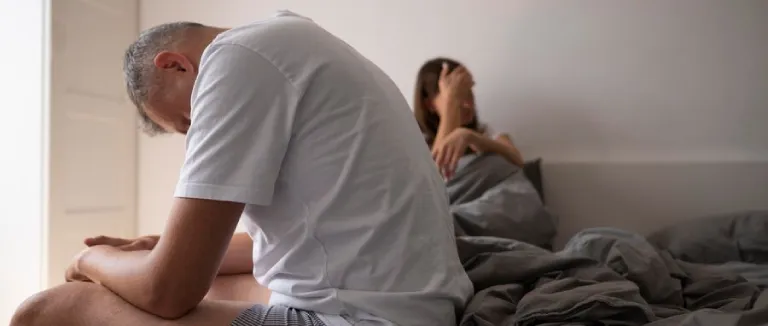What Is Sexual Reluctance? What Causes Sexual Reluctance?
Sexual reluctance is a condition that can be experienced by any sexually active adult. But this reluctance can start to become a serious problem when it closely affects a person's entire sexual life. There may not be a serious underlying cause of this problem, but there may also be causes such as hormonal disorders. For this reason, it is not recommended for people who have experienced sexual reluctance for a long time to ignore this condition.

Sexual desire is used to express the desire that the person creates for living sexuality. Being sexually willing is a result of being socially, physically, mentally and emotionally healthy. This condition, which occurs hormonally, can be low or high in a person. Low or no sexual desire is defined as sexual reluctance.
The desire for sexuality in people may increase or decrease from time to time. But if the decrease in desire has been going on for a long time and has reached the point where it will completely change your sex life, it may be due to sexual reluctance. Sexual reluctance is a condition that can affect people of any gender. The desire for sexuality decreases in the person who experiences sexual reluctance and the interest in sexuality disappears. People who experience this condition do not want to engage in any sexual activity, and thoughts about sexuality make them unhappy.
In advanced cases, sexual reluctance may cause a condition described as hypoactive sexual desire disorder. This situation is interpreted as the complete disappearance of sexual activities in a person and the absence of desire at all. This condition, which develops due to the same reasons as sexual reluctance, can occur if sexual reluctance persists for too long and is not taken seriously.
What Causes Sexual Reluctance?
Interest in sexuality may decrease due to reasons such as hormonal problems, age, lifestyle and stress. Damage to the veins and nerves may occur due to increased blood glucose in diabetes. This damage can affect the blood flow to the genitals, leading to problems with sexual function. This may cause a person's desire for sexuality to decrease. At the same time, heart diseases can also cause reluctance by affecting sexual activity in a similar way as diabetes. The causes of sexual reluctance in both sexes in general are as follows:
- Diabetes
- Osteoarthritis
- Cardiovascular diseases,
- High blood pressure
- Cancer
- Sleep apnea
- Antidepressant use
- Hormone medications
- High blood pressure medications
- Anxiety
- Depression
- Low self-esteem
- Alcohol
- Smoking
- Post-traumatic stress disorder
- Obesity
The cause of sexual reluctance may also differ between the sexes. Because the biological characteristics of both sexes are different, and there are also factors that create these differences. The reason unique to men for losing interest in sexuality is usually a decrease in testosterone levels. But there are more special reasons for women. The reasons why women lose interest in sexuality are as follows:
- Vaginal dryness
- Painful sexual intercourse
- Difficulty reaching orgasm
- Premenstrual syndrome (PMS)
- Menopause,
- Pregnancy
- Delivery
- Breastfeeding
What Causes Sexual Reluctance at a Young Age?
Sexual reluctance at a young age can occur for many reasons. Testosterone levels reach the highest values in men on average at the age of 18, and this causes a serious increase in sexual desire. Sexual reluctance may increase with the decrease of testosterone when men reach the age of 30. Sexual reluctance for women may increase as it gets closer to menopause. Inversely proportional to the decrease in fertility, an increase in women's sexual desire begins at the age of 20. At the age of 40, sexual reluctance may also begin to occur in women due to menopause and falling estrogen. Causes only related to age, such as menopause, do not pose a risk for sexual reluctance at a young age. Especially hormonal changes and psychological factors are the reasons for experiencing sexual reluctance at a young age.
It is natural for people who have just met with sexuality to have sexual reluctance. Because a person may have various taboos and fears about sexuality. These fears and worries may cause a person to want to distance themselves from sexuality. At the same time, hormones may change at a young age. Changes in hormones are also another reason for sexual reluctance. The psychological causes of sexual reluctance at a young age are:
- Depression: People with depression may feel reluctant to do many activities. One of these activities is sexuality. Fatigue and lack of self-confidence that develop due to depression are also among the causes of sexual reluctance.
- Anxiety: A person's excessive anxiety is also one of the causes of sexual reluctance. Being afraid of sexual intercourse and exaggerating this situation in the person's inner world can cause anxiety and create reluctance.
- Lack of self-confidence: Lack of self-confidence, which is one of the problems experienced by many people at a young age, also closely affects sexuality. A person's lack of confidence, especially physically, can cause them to want to stay away from sexuality turning it into fear over time and experience reluctance.
- Sexual trauma: Negative experiences in the past or during the first sexual experiences may cause a person not to want to experience sexuality again. Serious traumas such as sexual harassment may also be among the causes of this condition.
Symptoms of Sexual Reluctance
People who experience sexual reluctance tend to stop thinking about sexuality first. Decreased thoughts of sexuality also reduce interest in sexuality. People do not want to start or cannot continue sexual activity. A person cannot enjoy ongoing relationships. At the same time, everything about sexuality can create a feeling of unhappiness in a person, causing them to move further away. Especially if this problem occurs due to a bad sexual experience in the past, the thought of sexuality can cause panic. In people who have symptoms of sexual reluctance, examinations can be performed by a doctor for diagnosis and determination of the cause. Questions such as how long a person has been experiencing sexual reluctance or its severity help to learn the history of the condition. At the same time, hormone level tests and physical examinations are also important to detect if there is a health problem.
Sexual reluctance, which is a condition that can be experienced from time to time, may need to be treated if it affects a person's life. For this, first of all, the reason for the reluctance must be determined. If the cause of this condition is a psychological problem, getting support from a psychiatrist can help. An increase in sexual desire can also be observed by treating conditions such as the feeling created by bad sexual experiences from the past or stress, depression, and anxiety.
What Should I Do To Increase Sexual Desire?
Lifestyle changes such as being more physically active, taking advantage of relaxation techniques, eating a healthy diet, quitting alcohol and smoking can also help increase libido in sexual reluctance that is not caused by any health problems. At the same time, solving problems with one's partner, maintaining healthy communication and making libido-enhancing changes in their sex life can also help increase sexual desire.
If the person's sexual reluctance is at a serious level, hormone or drug treatments may be applied by the doctor. Hormone therapy is used to increase these levels, especially if low testosterone levels are present in men. At the same time, medications that help increase sexual desire can also be prescribed by doctors. Things that can be done to increase sexual desire include:
- Healthy communication with the partner
- Stress management
- Drug change
- Hormone therapy
- Psychotherapy
- Couples therapy
- Sexual therapy
- Healthy eating
- Kegel exercises
- Treatment and management of chronic diseases
- Getting back to a healthy weight in overweight and obese people
At the same time, some foods may have effects that increase sexual desire. Foods such as avocados, strawberries, watermelon, spinach are foods that can increase libido. But these nutrients should also not be consumed more than necessary.
* Contents of this page is for informational purposes only. Please consult your doctor for diagnosis and treatment. The content of this page does not include information on medicinal health care at Liv Hospital






